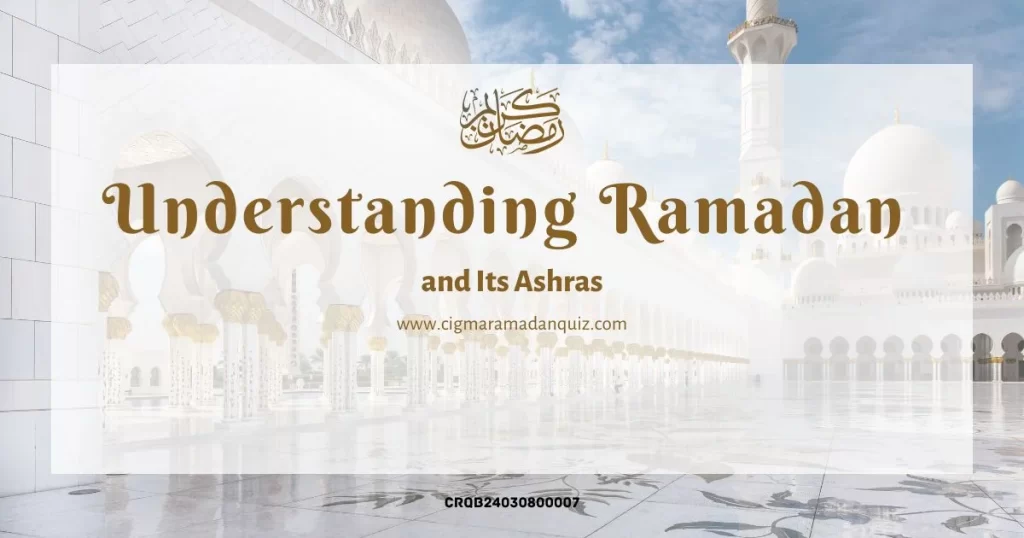Ramadan and Its Ashras
In Ramadan 2024, the ninth month of the Islamic calendar, holds profound significance for Muslims worldwide. It’s a time marked by fasting, reflection, devotion, and spiritual growth. Central to the observance of Ramadan are the three distinct periods known as Ashras, each carrying its own unique significance and focus. In this article, we delve into the importance of the 1st, 2nd, and 3rd Ashras of Ramadan, exploring their themes and practices.
Also Check : When is Ramadan 2024

1st Ashra of Ramadan – Mercy
The first ten days of Ramadan are dedicated to seeking the mercy and blessings of Almighty Allah. Muslims engage in acts of worship, seeking forgiveness for past transgressions and reflecting on the mercy bestowed upon them. The dua for the first Ashra encapsulates this sentiment, invoking Allah’s forgiveness and mercy. It’s a time for introspection and gratitude, acknowledging the boundless compassion of the Creator.
1st Ashra Dua
The Ramadan First Ashra Dua, also referred to as the Ramadan 1st Ashra Dua or ‘Pehle Ashray ki Dua’ in Urdu, is a supplication recited during the initial 10 days of Ramadan. This Dua holds significant importance for Muslims worldwide, as many devoutly recite it throughout the entire duration of the first Ashra of Ramadan.
وَقُل رَّبِّ اغْفِرْ وَارْحَمْ وَأَنتَ خَيْرُ الرَّاحِمِينَ
Translation : “O! My Lord forgive and have mercy, and You are the Best of Merciful” [Quran 23:118]
Also Check : Ramadan Mubarak 2024
2nd Ashra of Ramadan – Forgiveness
The second phase of Ramadan, spanning from the 11th to the 20th day, is dedicated to seeking forgiveness from Allah Almighty. Muslims engage in acts of repentance, acknowledging their mistakes and seeking redemption. The dua for the second Ashra reflects this focus on seeking forgiveness and turning towards Allah in repentance. It’s a period of spiritual renewal, where believers strive to cleanse their hearts and souls.
2nd Ashra Dua
The Dua for the 2nd Ashra, also referred to as the ‘Dusre Ashra ki Dua’ in Urdu, is a prayer commonly recited by many Muslims throughout the middle ten days of Ramadan.
أسْتَغْفِرُ اللهَ رَبي مِنْ كُلِ ذَنبٍ وَأتُوبُ إلَيهِ
Translation: “I ask forgiveness of my sins from Allah who is my Lord, and I turn towards Him.”
Also Check : Ramadan Quiz 2024
3rd Ashra of Ramadan – Safety
The final phase of Ramadan, starting from the 21st day until the end of the month, focuses on seeking safety from the Hellfire. Known as the Ashra of Safety, it’s a time when Muslims fervently pray for protection from the torment of Hell. The Night of Power (Lailatul Qadar), a night of immense spiritual significance, falls within this Ashra. Many Muslims engage in additional acts of worship, such as Aitkaf (seclusion for prayers), during this period, maximizing their spiritual efforts.
3rd Ashra Dua
The Third Ashra Dua, also referred to as the Dua for the last 10 days of Ramadan or ‘Teesra Ashra ki Dua’ or ‘Akhri ashra Ki Dua’, holds significance for Muslims observing the final stretch of the holy month. This supplication is recited by countless Muslims worldwide during the concluding 10 days of Ramadan.
ﺍﻟﻠﻬﻢ ﺃﺟﺮﻧﺎ ﻣﻦ ﺍﻟﻨﺎﺭ
Translation: “O Allah, save me from the fire of Hell”
Also Check : Rules of Taraweeh Salah and Taraweeh Ki Dua

FAQs
1. What is the significance of Ramadan for Muslims?
Ramadan 2024 holds immense significance for Muslims as it is the month of fasting, reflection, and spiritual growth. It’s a time when believers deepen their connection with Allah through acts of worship and devotion.
2. How long does Ramadan last?
In Ramadan 2024 lasts for 29 to 30 days, depending on the sighting of the moon. It follows the lunar calendar, with each month beginning with the sighting of the new moon.
Also check : Ramadan Fasting 2023-24
3. What are the Ashras of Ramadan?
The Ashras of Ramadan 2024 refer to the three distinct phases of the month: Mercy, Forgiveness, and Safety. Each Ashra carries its own significance and focus, guiding Muslims through different aspects of spiritual growth.
4. What is the significance of the Night of Power (Lailatul Qadar)?
The Night of Power, or Lailatul Qadar, holds immense significance in Islam as it is believed to be the night when the Quran was first revealed to Prophet Muhammad (peace be upon him). It is a night of profound blessings and spiritual renewal, occurring within the third Ashra of Ramadan.
5. How do Muslims observe the Ashras of Ramadan?
Muslims observe the Ashras of Ramadan through acts of worship, prayer, and reflection. Each Ashra provides an opportunity for spiritual growth, with specific dua and practices associated with each phase.
The Ashras of Ramadan serve as guiding pillars for Muslims during this sacred month, offering a structured framework for spiritual growth and reflection. Through seeking mercy, forgiveness, and safety, believers deepen their connection with Allah and strive towards self-improvement and righteousness. As Muslims embark on this journey of faith, they embrace the profound significance of each Ashra, enriching their Ramadan experience and drawing closer to their Creator.


